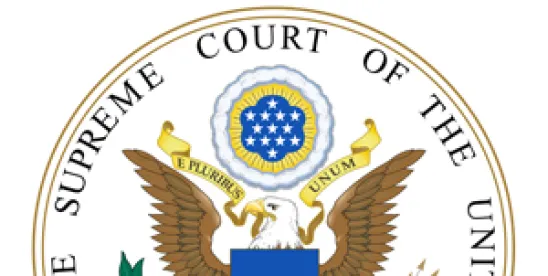A 6-3 opinion from the Supreme Court of the United States in Iancu v. Brunetti affirmed a Federal Circuit 2017 decision. Both rulings found the ban on the registration of immoral or scandalous trademarks under the Lanham Act to be an unconstitutional viewpoint restriction under the free speech guarantees of the First Amendment.
In Depth
In its 2017 decision in Matal v. Tam, the Supreme Court of the United States invalidated the Lanham Act’s proscription on the registration of disparaging trademarks under 15 U.S.C. §1052(a) as a violation of the First Amendment. On Monday, June 24, 2019, the court issued its decision in Iancu v. Brunetti with respect to the constitutionality of neighboring language in §1052(a) that prohibits the registration of trademarks considered to be “immoral or scandalous.” For the same reasoning outlined in Matal—finding the trademark registration ban to discriminate on the basis of viewpoint—the court determined that the United States Patent and Trademark Office’s (USPTO) refusal of immoral or scandalous trademarks disfavors certain ideas, and thus infringes the First Amendment.
Background
The named respondent, Erik Brunetti, is an artist and entrepreneur who founded a streetwear line in 1991 under the brand name FUCT. Brunetti has always claimed that the FUCT trademark is pronounced by saying each of the four letters, as F-U-C-T; but the USPTO and the courts along the way have all noted that consumers may read and pronounce the mark differently, and in a manner phonetically identical to a popular curse word.
Brunetti had made at least one unsuccessful attempt to register the FUCT mark in relation to clothing goods as far back as 1993. But, it was only after Brunetti’s 2011 trademark application for the FUCT brand name was refused registration by both the USPTO and the USPTO Trademark Trial and Appeal Board (under §2(a) of the Lanham Act as consisting of immoral or scandalous matter that a “substantial composite of the general public” would find “shocking,” “disgraceful” or “vulgar”), that he appealed to the Federal Circuit, which held that the proscription on registration of immoral or scandalous trademarks violated the First Amendment. The Supreme Court then granted certiorari, as it is wont to do when a lower court invalidates a federal statute.
Opinion of the Court
Before addressing the specific FUCT trademark at issue in Brunetti’s appeal, Justice Kagan provided a brief primer on the Matal decision, which held that if a trademark registration bar is viewpoint based, it is unconstitutional, since the government may not discriminate against speech based on the ideas or opinions conveyed by such speech. Thus, within this framework, the court determined that the §2(a) immoral or scandalous registration proscription similarly discriminates based on viewpoint, and is therefore unconstitutional.
The Immoral or Scandalous Registration Bar Is Viewpoint Based
The court’s opinion examined dictionary definitions of the terms “immoral” and “scandalous” to assess the potential for viewpoint biases. Here, the court determined that the statutory language invites the USPTO to apply a viewpoint discriminatory position by accepting for registration trademarks that are “aligned with conventional moral standards,” and rejecting those trademarks that are hostile to such societal mores. The court also took time to flag specific examples of the USPTO’s viewpoint-based acceptance or rejection standards in relation to trademarks with terms or imagery that referenced drugs, religion and terrorism. In short, the court found that the USPTO allows for registration of marks that express societally acceptable views (i.e., JESUS DIED FOR YOU) and refuses trademarks that do not necessarily reflect views that are widely acceptable to a “substantial composite of the general public” (i.e., BONG HITS 4 JESUS).
The Court Rejects the Government’s Limiting Construction of the Statute
Arguing in support of the “immoral or scandalous” basis for trademark registration refusal, the Government alleged that the statute is susceptible of a limiting construction that removes any viewpoint bias. More specifically, the Government proposed narrowing the §2(a) registration bar to marks that are offensive or shocking to a substantial segment of the public only because of their mode of expression, and not tied to the expression of a viewpoint. According to the Government, this “mode of expression” assessment would primarily pertain to marks that are “vulgar… lewd… sexually explicit or profane.”
The court immediately rejected the Government’s proposal, however, as an attempt by the Government to create a new statute, rather than interpreting the law that Congress enacted. Instead, the court pointed out that “the statute says something markedly different,” since the §2(a) language does not limit trademark registration refusals to only lewd, sexually explicit or profane marks, nor does it consider only the “mode of expression” of a trademark.
In Justice Alito’s concurrence with the court’s determination that the “substantially overbroad” “immoral or scandalous” bar violates the First Amendment, he also touched on the Government’s proposal to reframe the statutory language as an attempt to “substitute a new statute for the one now in force,” and refused to do so.
Unlike the Matal v. Tam decision in which a unanimous court agreed that the ban on disparaging trademarks was unconstitutional, in this case, Justices Roberts, Breyer and Sotomayor each authored dissenting opinions in which they proposed dividing the “immoral or scandalous” provision into its component parts. The dissenting justices opined that an “immoral” assessment likely contemplates viewpoint of the speech and thus is unconstitutional, but that the “scandalous” ban could be read as viewpoint neutral in banning truly “obscene, vulgar, or profane marks,” for which a registration proscription may not violate First Amendment protections.
Practice Note: Pursuant to the court’s decision, the USPTO is likely to issue updated guidelines on the review and registration of trademarks under §2(a) of the Lanham Act, which will apply to newly filed applications, as well as to pending trademark applications that previously received an “immoral or scandalous” refusal and were suspended pending the Supreme Court’s determination in Brunetti.




 />i
/>i

